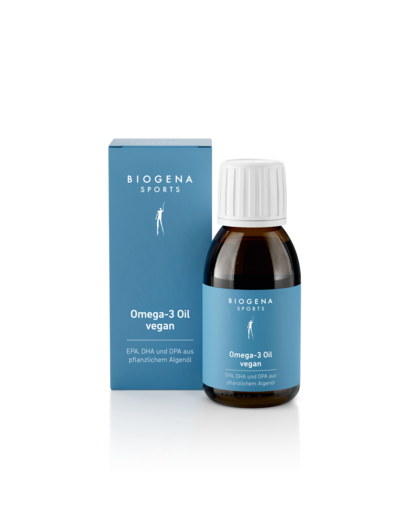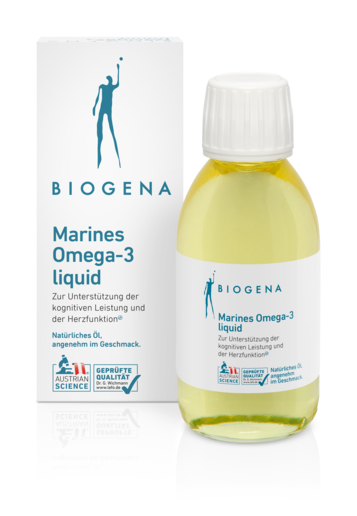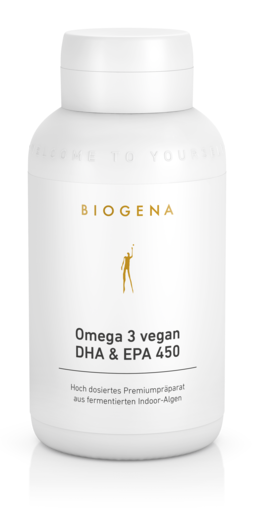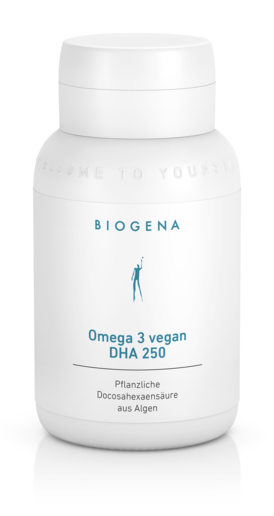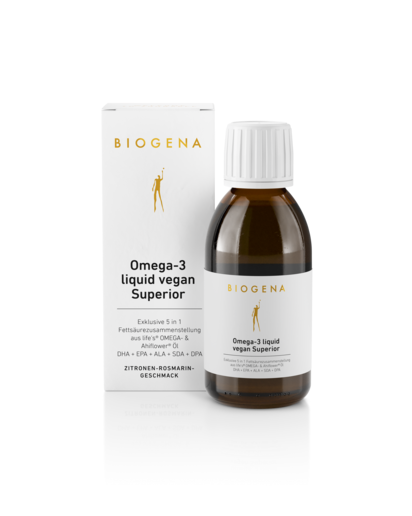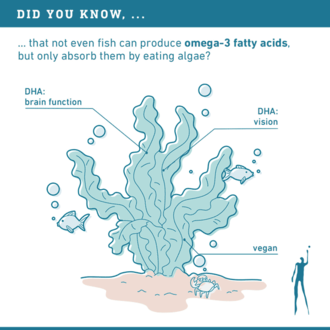Omega-3 capsules and omega-3 oil
Omega-3 fatty acids support important bodily functions. Highly concentrated in the form of capsules or oil, they ensure the daily requirement of the essential fatty acids DHA and EPA, which, for example, make a significant contribution to maintaining normal heart function and much more.


The difference between omega-6 and omega-3?
These are among the so-called polyunsaturated fatty acids (PUFA). Depending on their structure, the polyunsaturated fatty acids that are so important for humankind can be divided into omega-3 and omega-6 fatty acids. The ratio of the physiological counterparts is crucial, not least for our vitality.
The target ratio of omega-6 fatty acids to omega-3 fatty acids in the diet should be a healthy 2:1 to a maximum of 5:1. While omega-6 is found in many vegetable oils and animal products such as eggs, milk and meat, only a few selected foods provide sufficient amounts of omega-3 fatty acids. This makes it all the more important to pay more attention to your own omega-3 intake. Omega-3 fatty acids in the form of capsules or oil can help with this.
Not all fats are the same. But what are the differences between fatty acids? Here's what our science team has to say: Saturated and unsaturated fatty acids - which are healthy?
Omega-3 capsules: High-dose food supplements
The body needs to consume polyunsaturated fatty acids in the same way as vitamins and minerals. Thanks to long-term observations and scientific studies, we now know exactly how important a sufficient intake of omega-3 fatty acids is for us humans. For this reason, BIOGENA has developed highly concentrated omega-3 capsules with quality-tested raw materials that supply the body with the valuable fatty acids EPA and DHA.
Premium fish oil capsules
Our capsules are available with highly concentrated and ultra-pure premium fish oil (Goldenomega®) from small cold-water fish from unpolluted waters off the coast of Peru and Chile – with Friend of the Sea® certification. Our unique quality: these products contain a high proportion of DHA and EPA – to support mental performance, strengthen the psyche and maintain normal vision and heart function. In combination with vitamin E, its antioxidant properties also help to protect cells from oxidative stress. Goldenomega® also uses a patented purification process that enables a highly purified quality fish oil without heavy metal contamination and environmental pollutants.
Premium algae oil capsules
In addition to fish oil capsules, BIOGENA also offers high-dose omega-3 capsules made from plant-based and natural algae oil – the vegan alternative to fish and krill oil. Made from fermented and sustainably cultivated premium microalgae oil (Schizochytrium sp.), these vegan omega-3 capsules achieve the same beneficial effects: strengthening mental health, supporting normal heart function and maintaining normal vision and brain function.
Omega-3 oil: Liquid Omega-3
Some people like to take additional omega-3 fatty acids, but cannot or do not want to swallow the large fish oil capsules. There are many reasons why people are reluctant to swallow capsules. However, this doesn't have to be a barrier to taking in essential omega-3 fatty acids. One way of supplying the body with DHA and EPA is a liquid omega-3.
Linseed oil
BIOGENA's organic linseed oil from Austria is cold-pressed and therefore rich in omega-3 fatty acids. Compared to other vegetable oils, this natural product contains a very high concentration of omega-3. Slightly nutty and hay-like in flavour, this oil is perfect for preparing cold dishes.
Fish oil
Quality fish oil is characterised by a pleasant lemony taste and is therefore also suitable for people who do not particularly appreciate the taste of fish. The omega-3 fish oil is easy to dose with a spoon and can be consumed on its own or used to flavour salads, vegetables or other dishes. BIOGENA offers certified fish oil from sustainable fishing sources
The difference between vegetable and marine (fish-derived) oil
- Marine oils from fish: Marine oils (e.g. from fatty fish) provide us with physiologically important DHA and EPA. Patented purification processes enable premium suppliers to produce highly purified and quality fish oil without heavy metal contamination and environmental pollutants.
- Vegetable algae oils: In the vegan segment, hardly any other nutrient is in as high demand as plant-based omega-3 fatty acids. In recent years, oil from the microalgae Schizochytrium sp. has emerged as an excellent vegan alternative to fish and krill oils. As a cultivated plant-based raw material, microalgae oil is an excellent omega-3 option not only for plant-based dieters, but also for people who care about sustainable nutrition. Fermented and sustainably cultivated premium microalgae oil (Schizochytrium sp.) provides high doses of the omega-3 fatty acids EPA and DHA.
- Plant oils: Selected plant oils (e.g. linseed oil) provide plant-based omega-3 in the form of ALA (alpha-linolenic acid). Although ALA can be metabolised by our body into EPA and DHA, metabolism varies from person to person and is also subject to certain influencing factors such as age and gender. For example, studies have shown that men are less able to convert ALA into DHA compared to women (4 % vs. 9 %).
Summary: vegetable oils or marine oil for omega-3 intake
Plant-based omega-3 in the form of alpha-linolenic acid from linseed oil and other sources is undoubtedly a valuable supplement; at the same time, however, you should keep an eye on your individual omega-3 levels (ideally by measuring your omega-3 index) and consider using an EPA/DHA-rich algae oil or a fish oil supplement if necessary. The BIOGENA Good Health Study also shows us this, as the intake of the 1,377 Austrian participants was poor in most cases – 88 out of 100 participants were not getting an optimal intake of omega-3 fatty acids (omega-3 index: <8%).

Omega-3 for vegans: Is it possible?
In most cases, highly-concentrated DHA is obtained from fish. However, fish do not produce the omega-3 fatty acids themselves, any more than we do – they absorb them by eating algae.
Certain microalgae contain valuable DHA and are therefore an excellent vegan alternative to conventional sources of these popular omega-3 fatty acids. Fish accumulate DHA in their natural environment by consuming these marine algae. For this reason, cultivating these algae is a sensible and more sustainable way to ensure the intake of this important omega-3 fatty acid. Vegetarians and vegans thus have an alternative that corresponds to their dietary plan.
Sources of vegan omega-3 fatty acids at a glance:
- Microalgae such as Schizochytrium sp. provide EPA and DHA
- Vegetable oils such as linseed oil, hemp oil, walnut oil and camelina oil provide ALA





